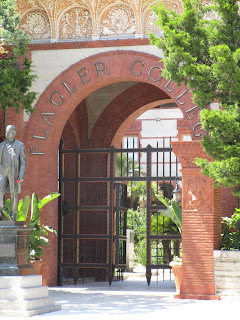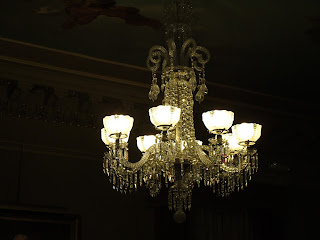No Travel
We scheduled three activities on today's agenda, so we tried for an early start to the day. Before leaving the marina, however, we took some time to enjoy watching the egrets working on their breakfast at the docks. Several egrets jockeyed for the best fishing positions along the dock while a multitude of mullet fish repeatedly jumped out of the water. Capturing the egrets in action was a lot easier than photographing jumping fish.
 |
| Egrets Fishing at the Docks |
By the time we left to bike into town, Clark had taken several video clips of the jumping mullet, so we got a later start on our day than anticipated.
On Saturday at 3:00 we biked to a Marine Supply store in town only to find out they closed at noon. Today, we biked back again to see what stock they had on hand. I found nothing to be of any particular interest, and neither did Clark. We inquired about finding Mainship parts and the Marine Supply store sent us down the street to a place called the Sailor's Exchange. This place looked more like a thrift shop for boaters than a standard retail store. Sadly we did not find what Clark hoped to find. We left there empty-handed as well.
That task out of the way, we stopped by Meehan's Irish Pub to retrieve a coat accidentally left behind by a fellow boater. I waited outside with Clark with the bikes, and he went inside. I thought he would never come out of there, and when he did, he came out empty-handed! No one could find the jacket anywhere in the restaurant. Apparently while Clark waited, he found something to photograph.
 |
| Inside Meehan's Irish Pub |
Somehow the morning had disappeared and it was rapidly approaching lunchtime. Clark texted the jacket owner to let him know we had failed to find the jacket, and we headed back to the boat to grab a quick lunch before heading out for our planned tours. As we ate lunch, Clark got more input from the jacket owner as to who had it and where. We figured we could stop back later armed with the additional information on how to locate the jacket.
For our first tour of the day we selected a visit to Flagler College named after Henry Flagler who played a major role in St. Augustine's growth in tourism.
 |
| Gateway into Flagler College |
We got very lucky with our timing, as we did not plan ahead, and arrived right at one o'clock when a tour of the main building had just started. The tour guide, Allison, did an excellent job. She just completed her sophomore year at Flagler and loves it there. It showed!
Constructed by Henry Flagler and opened in 1888, the building we toured served St. Augustine as the Ponce De Leon Hotel. Built with the very rich in mind, the ornate hotel is truly breath-taking. At that time, it cost $4000 for a visitor to stay at the Ponce de Leon Hotel for the season that ran from just after Christmas until Easter. Shorter-term stays were not allowed. Allison told us that in today’s dollars that translates to $100,000 for about a three-month stay – a little too deep for my pockets!
We started the tour in the hotel banquet hall, which now serves students of the college as their dining hall. Allison took us to the private entrance past Tiffany-designed windows. The Tiffany glass displayed here is the largest private collection of Tiffany's work.
 |
| Tiffany Glass |
 |
| Dining Hall |
 |
| Minstrel Loft in Banquet Hall |
 |
| Example of the Tiffany Glass on Display |
1 - Spanish Renaissance
2 - Religion including the design of the courtyard itself in the shape of a Celtic Cross and
3 - Nautical
 |
| Tower at Flagler College held cisterns used to store water to provide running water to hotel guests |
 |
| Courtyard Fountain |
 |
| Each of 4 turtles represent the 4 seasons |
 |
| Each of 12 frogs represent the 12 months of the year |
From the courtyard we moved into the Rotunda where we saw yet more Tiffany glass in the top of the dome in the room. The mosaic tile floor is made from thousands of individual pieces of mosaic imported from Africa with each piece individually laid. To finish on schedule fifty men worked side-by-side to lay the tile.
 |
| Rotunda |
 |
| Dome with Tiffany Glass Top |
 |
| Lady Discovery |
One very interesting and strange tale that Allison told us related to Henry Flagler's death. After his death one of the tiles in the floor of the hotel took on his appearance. Allison was able to show us the tile that definitely sports a person's visage where none others do. The janitor at the time swore that the face did not appear there before Flagler's death. (Theme song to The Twilight Zone please)
 |
| Is that really Henry Flagler's face?? |
We next moved into the Grand Parlor which was designed by Tiffany and contains eleven, identical Tiffany chandeliers made of Austrian crystal.
 |
| Grand Parlor of Hotel |
 |
| Tiffany Austrian Crystal Chandelier |
The room contained displays of art and family pictures of Henry Flagler and his three wives. One major item of interest in this room, however, is the white onyx clock. Simply magnificent!
 |
| White Onyx Clock and Mantle Largest in the World |
Every room was designed differently from every other room. These 300 rooms are now used as the Freshman women's dormitory. Some rooms hold as many as six students and others hold only one. Allison shared her room with two other girls.
We took a step further back in time with our next, and final tour of the day. We went to see the Spanish fort known as the Castillo de San Marcos. This fort is part of the National Parks System.
 |
| Signal Tower used to communicate with another signal tower across the water to warn of imminent attack on the town and fort (tower later became the first lighthouse) |
 |
| Fort Interior For one siege it held and fed 1500 people for 51 days! |
 |
| View from the Fort Besides walls, cactus and prickly yucca plants also provided defense |
 |
| Spanish Canon |
 |
| Top View of SpanishCanon |
 |
| View of the Moat and Fort Exterior |
After a fun day of exploring and with our heads full of historic trivia, we went back to the boat for dinner and relaxation. Shortly after we settled in, Clark got the phone call from Meehan's Irish Pub that the coat could now be collected. While Clark went for a third, and final, trip to the restaurant, I spent time catching up on the blog. Clark managed to take 592 pictures over the past three days in St. Augustine, so I had my work cut out for me deciding which to include in the blog updates!

Thanks for sharing informative stuff with us! Almarinesurveyors
ReplyDelete